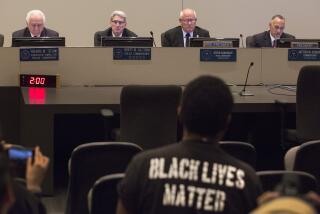The Same Old Baghdad
- Share via
The U.N. Security Council argued for more than a month and rejected more than 25 candidates before agreeing this week on Hans Blix of Sweden, the former head of the Vienna-based International Atomic Energy Agency, to lead the commission charged with finding and destroying Iraq’s nuclear, chemical and biological weapons. But Baghdad has already denounced the new body as a tool of American spying. If it holds to its defiance and refuses to cooperate with further arms inspections, the Security Council’s readiness to enforce its own resolutions will again be tested.
Firm action is by no means a given. France, China and Russia, all with veto power on the council, abstained on the December vote that set up the new U.N. Monitoring, Verification and Inspection Commission, a successor to the previous special commission, whose inspectors were barred from Iraq more than a year ago. That gives the three countries the option of claiming they have not endorsed its purposes. All want to lift the sanctions imposed on Iraq nine years ago because all are eager to resume lucrative trade and commercial relations with Baghdad. But the United States and Britain are determined that sanctions not be lifted until it’s clear that Iraq is no longer hiding weapons of mass destruction.
Only unhindered on-the-ground inspections by experts can assure that. Richard Butler of Australia and Rolf Ekeus of Sweden, previous heads of the inspection program, insisted on that access in their time. Hans Blix must be similarly resolute in the face of Iraqi obstructionism.
More to Read
Sign up for Essential California
The most important California stories and recommendations in your inbox every morning.
You may occasionally receive promotional content from the Los Angeles Times.










